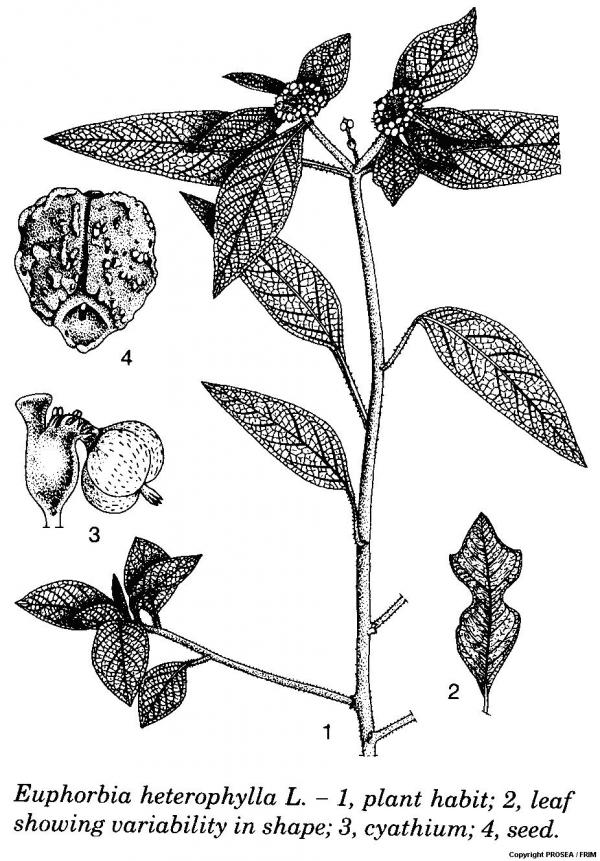Scientific Name
Euphorbia heterophylla L.
Synonyms
Agaloma angustifolia Raf., Cyathophora ciliata Raf., Cyathophora heterophyla (L.) Raf., Cyathophora picta Raf., Euphorbia calyciflora Sessé & Moc., Euphorbia elliptica Lam., Euphorbia epilobiifolia W.T.Wang, Euphorbia frangulifolia Kunth, Euphorbia geniculata Ortega, Euphorbia havanensis Willd. ex Boiss. [Illegitimate], Euphorbia linifolia Vahl [Illegitimate], Euphorbia lockhartii Steud. [Invalid], Euphorbia morisoniana Klotzsch, Euphorbia pandurata Huber, Euphorbia prunifolia Jacq., Euphorbia taiwaniana S.S.Ying, Euphorbia trachyphylla A.Rich., Poinsettia frangulifolia (Kunth) Klotzsch & Garcke, Poinsettia geniculata (Ortega) Klotzsch & Garcke, Poinsettia havanensis Small, Poinsettia heterophylla (L.) Klotzsch & Garcke, Poinsettia morisoniana (Klotzsch) Klotzsch & Garcke, Poinsettia prunifolia (Jacq.) Klotzsch & Garcke, Poinsettia ruiziana Klotzsch & Garcke, Tithymalus heterophyllus (L.) Haw., Tithymalus prunifolius (Jacq.) Haw. [1]
Vernacular Name
| Malaysia | Pekapar (Peninsular)[2]; lidah jin [3], pekapa [4] |
| English | Japanese poinsettia, mexican fireweed, mole plant [2], annual poinsettia, cruel plant, Mexican fireplant, mole plant, paint leaf, painted milkweed, wild poinsettia [4] |
| China | Bai bao xing xing cao [4] |
| India | Bhedi gida, dudhli,palachettu, sugavedi keerai [4] |
| Thailand | Yaa yaang (General); bai taang dok, luuk khoei taai mae yai tham sop (Bangkok) [2] |
| Vietnam | C[or] m[ur] [2] |
| Africa | Gekleurde euphorbia, gekleurde melkbossie, gekleurde melkkruid [4] |
| Mexico | Chilamatillo, hierba del duende,nela, picachalih, tianguis, casalina, catalina,contrahierba, obonk’aak, hobon-kax, hobonte [4] |
| Peru | Cortante, flor de pascua de monte, golondrina, hua chapurga, leche-leche, mala leche, pascua, pastor de monte [4] |
Geographical Distributions
Euphorbia heterophylla is found native to Central and South America, but nowadays naturalised throughout the tropics. Within Malesia, it is not yet reported from the Philippines. This plant is a noxious weed of cocoa, tea, rice and sugar cane, also found in gardens and waste places, and in alluvial soils and sandy beaches, up to 3000 m altitude. [2]
Botanical Description
E. heterophylla comes from the Euphorbiaceae family. It is an annual or facultative perennial and unarmed herb up to 110(-200) cm tall. [2]
The leaves are arranged alternately, lance-shaped or ovate to distinctly fiddle-shaped, measuring 3-14 cm x 0.5-7 cm, with wedge-shaped to rounded base, obtuse to slightly acuminate at apex, with entire to serrulate margin, dull green, hairless to sparsely hairy above and below. The petiole is up to 3(-6) cm long and hairy. [2]
The inflorescence is composed of densely-clustered cyathia in axillary or terminal cymes. The bracts are similar to the leaves but progressively smaller and paler green but sometimes purple-spotted. The cyathia is 1(-2) peltate, spotted with funnel-shaped glands with a circular, opening and yellow anthers measuring 0.5-1.2 mm wide. [2]
The capsule is deeply 3-lobed, measuring 4-5.5 mm x 3.5-4.5 mm, smooth and with fine hairs. [2]
The seeds are truncate-ovoid and bluntly covered with warty protuberances. [2]
Cultivation
No documentation.
Chemical Constituent
No documentation.
Plant Part Used
No documentation.
Traditional Use
No documentation.
Preclinical Data
No documentation.
Clinical Data
No documentation.
Poisonous Management
No documentation.
Line Drawing

References
- The Plant List. Ver1.1. Euphorbia heterophylla L. [homepage on the Internet]. c2013 [updated 2012 Mar 23; cited 2015 Jun 11] Available from: http://www.theplantlist.org/tpl1.1/record/kew-80087
- Nguyen Nghia Thin, Sosef MSM. Euphorbia heterophylla L. In: de Padua LS, Bunyapraphatsara N, Lemmens RHMJ, editors. Plant Resources of South-East Asia No. 12(1): Medicinal and poisonous plants 1. Leiden, Netherlands: Backhuys Publisher, 1999; p.268
- Herbal Medicine Research Centre, Institute for Medical Research. Compendium of medicinal plants used in Malaysia. Volume 1. Kuala Lumpur: HMRC IMR; 2002. p.332.
- Quattrocchi UFLS. CRC World Dictionary of Plant Names: Common names, scientific names, eponyms, synonyms, and etymology. Volume III E-L. Boca Raton, Florida: CRC Press; 2012. p. 172-173


